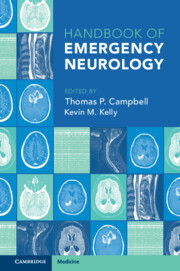Book contents
- Handbook of Emergency Neurology
- Handbook of Emergency Neurology
- Copyright page
- Contents
- Contributors
- Section 1 Neurologic Examination and Neurodiagnostic Testing
- Section 2 Common Neurologic Presentations: A Symptom-Based Approach
- Section 3 Specific Neurological Disorders in Emergency Medicine
- Chapter 11 Ischemic Stroke and Transient Ischemic Attack
- Chapter 12 Intracranial Hemorrhage
- Chapter 13 Seizures
- Chapter 14 Infections of the Central Nervous System
- Chapter 15 Traumatic Brain Injury
- Chapter 16 Increased Intracranial Pressure and Herniation Syndromes
- Chapter 17 Traumatic and Nontraumatic Spinal Cord Disorders
- Chapter 18 Neuro-ophthalmology Emergencies
- Chapter 19 Brain Tumors and Other Neuro-oncologic Emergencies
- Chapter 20 Peripheral Nerve and Neuromuscular Disorders
- Chapter 21 Movement Disorders
- Chapter 22 Multiple Sclerosis
- Chapter 23 Hydrocephalus and Shunt Evaluation
- Chapter 24 Post-Arrest Neurologic Resuscitation
- Chapter 25 Neurotoxicology
- Chapter 26 Neurologic Emergencies of Pregnancy
- Chapter 27 Brain Death
- Chapter 28 Hysteria
- Index
- References
Chapter 22 - Multiple Sclerosis
from Section 3 - Specific Neurological Disorders in Emergency Medicine
Published online by Cambridge University Press: 10 January 2024
- Handbook of Emergency Neurology
- Handbook of Emergency Neurology
- Copyright page
- Contents
- Contributors
- Section 1 Neurologic Examination and Neurodiagnostic Testing
- Section 2 Common Neurologic Presentations: A Symptom-Based Approach
- Section 3 Specific Neurological Disorders in Emergency Medicine
- Chapter 11 Ischemic Stroke and Transient Ischemic Attack
- Chapter 12 Intracranial Hemorrhage
- Chapter 13 Seizures
- Chapter 14 Infections of the Central Nervous System
- Chapter 15 Traumatic Brain Injury
- Chapter 16 Increased Intracranial Pressure and Herniation Syndromes
- Chapter 17 Traumatic and Nontraumatic Spinal Cord Disorders
- Chapter 18 Neuro-ophthalmology Emergencies
- Chapter 19 Brain Tumors and Other Neuro-oncologic Emergencies
- Chapter 20 Peripheral Nerve and Neuromuscular Disorders
- Chapter 21 Movement Disorders
- Chapter 22 Multiple Sclerosis
- Chapter 23 Hydrocephalus and Shunt Evaluation
- Chapter 24 Post-Arrest Neurologic Resuscitation
- Chapter 25 Neurotoxicology
- Chapter 26 Neurologic Emergencies of Pregnancy
- Chapter 27 Brain Death
- Chapter 28 Hysteria
- Index
- References
Summary
Multiple sclerosis (MS) is a common disorder, characterized by inflammatory lesions of the CNS (brain and spinal cord), affecting approximately 0.15% of the population in the United States. The disease has a peak incidence in the second and third decades of life, typically presenting in this age group as relapsing–remitting disease (RRMS). Patients with RRMS present to the emergency department (ED) with acute exacerbations of their illness, as well as “pseudorelapses” relating to concomittent illness, often febrile. Good recovery from attacks is typically seen following the initial attacks. Attack frequency decreases with time, but many patients begin to accumulate permanent disability within the first decade after onset. In patients over 40 years of age, the disease presents commonly as a slow primary progressive illness (PPMS). Approximately 10–15% of patients have PPMS.
Keywords
- Type
- Chapter
- Information
- Handbook of Emergency Neurology , pp. 325 - 333Publisher: Cambridge University PressPrint publication year: 2023

